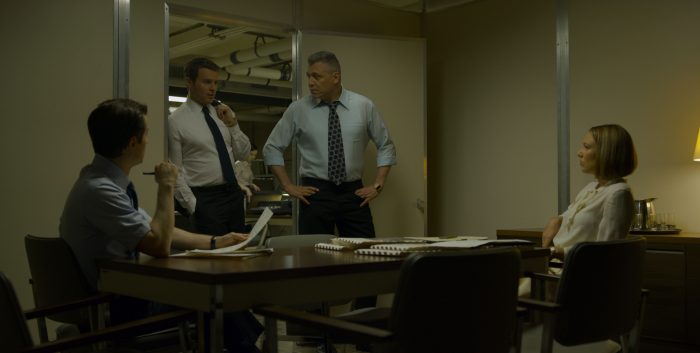'Mindhunter' Season 2 Goes Further Into The Heart Of Darkness
Note: This is a spoiler-free review of the first three episodes of Mindhunter season 2. We'll have a full spoiler-filled review of the entire season next week.
After a long hiatus, Mindhunter returns for an all-new stylish season – one overflowing with doom, lit by flashlight beams cutting through clutching darkness. One gets the sense of escalation here – the more the FBI's blossoming Behavioral Science Unit studies the serial killers, the more serial killers there seem to be. As if the very act of trying to understand these individuals is inadvertently spawning more of them. And there's no end in sight. After a murder is uncovered close to home, Nancy Tench, wife of FBI agent Bill Tench, comments: "This sort of thing doesn't happen here." "It happens everywhere," Bill replies. The darkness is spreading.
With its first three episodes – all of which are directed by David Fincher – Mindhunter season 2 immediately establishes itself as the best looking show on Netflix. There's nothing on the streaming service – or indeed, TV in general – that looks quite as cinematic. Fincher's controlled camera movements – always precise, always constructed to draw our eye along with the action – yield breath-taking results. Here is a series where most of the time is spent with characters sitting around talking, and yet Fincher finds was to keep things exciting.
One back and forth between Tench (Holt McCallany, as endearingly gruff as ever) and a serial killer survivor is shot in the cab of a car, with Tench in the front and the victim in the back. The victim – who doesn't like to be stared at – is always out-of-focus and bathed in shadow. Any time Fincher wants to cut to a different angle to spruce things up, he'll move outside the car shooting in, the victim's face blurred by reflective windows. It makes an already intense moment doubly unsettling.
The first three episodes of Mindhunter season 2 are loaded with moments like this, and watching them can be a little disorienting. We tend to grow accustomed to the way the average TV show is shot, so much so that it can catch us off-guard when something forgoes standard practices. Many modern TV shows are overly dark and underlit, but Mindhunter's approach to darkness is unique. The cinematographers bathe every scene in hazy gloom – even rooms with lights on seem eerily murky. Yet there's never a moment where the action unfolding is incoherent. What a thrill it is to take in such visuals.
Of course, the visuals would simply be hollow were it not for the crackling smart scripts, bursting with buzzing, clipped dialogue – all of it delivered by a stellar cast. If you're making a piece of entertainment primarily about people talking, you better make damn sure your actors are able to make simple conversations sound exciting.
The first season of Mindhunter left the burgeoning Behavioral Science Unit at a crossroads. Agent Holden Ford (Jonathan Groff) was willing to bend the rules and even possibly break the law in order to advance his own hypothesis – and his actions left newly assigned agent Gregg Smith (Joe Tuttle) uncomfortable enough to anonymously report Holden. Now, the entire team stands at risk of being disbanded, leaving everyone suspicious of each other. Tench has had a particularly nasty falling out with psychologist Wendy Carr (Anna Torv). Holden, meanwhile, ended the season by succumbing to a panic attack, suggesting that the work he's so invested in might be detrimental to his health.
Season 2's premiere episode sets about tying up any hanging threads from the season 1 finale while also setting up the season to come. The BTK killer, who was glimpsed only in passing last season, has a much more expanded role this time – and his heinous actions have become known to the agents. Meanwhile, the Behavioral Science Unit finds itself with a new director – one who is fully committed to expanding the unit and making its practices standard procedure. The new director puts much of his faith in Holden – but is he mentally prepared to return to work? Wendy and Bill have their doubts.
By the time the third episode of the season draws to a close, the main narrative has begun to take shape as Holden learns about the Atlanta Child Murders – which took place between 1979 and 1981, and resulted in the deaths of at least 28 individuals – many of them children. Are the murders connected? Law enforcement has their doubts – the modus operandi for each case appears different, suggesting this isn't the work of a serial killer. But Holden has his doubts – he sees a pattern within the pages of a hastily cobbled together file. He sees the darkness is spreading. And it might be already too late to stop it.
Mindhunter season streams on Netflix August 16.

